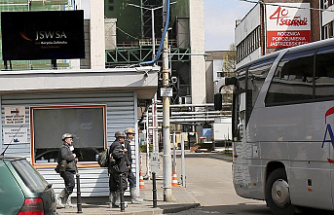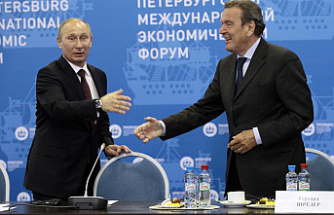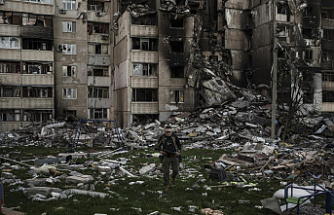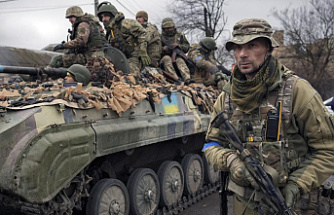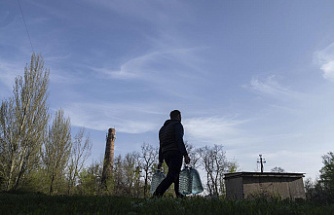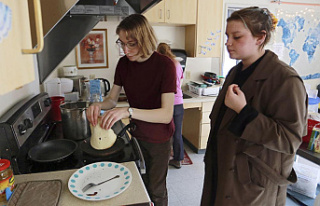Supply is running low and making deliveries is a complex calculus that comes with unpredicted risks.
Officials claim that the Alliance for Public Health quietly works to show how American aid is reaching the people in the besieged country, on a different wavelength than U.S. military and diplomatic support for the Ukrainian government.
Since its inception, the Ukraine-based humanitarian organisation has been operating for over 20 years. It has received millions from the U.S. Agency for International Development, the Centers for Disease Control and Prevention and other federal programs to combat HIV worldwide.
Andriy Klepikov, the executive director, stated that it was impossible to shut down during the invasion. Patients in Ukraine are suffering from one of the worst HIV epidemics in Western Europe. They need to be able to access their medication every day.
According to him, his group had a "risk management program" in place that would allow it to continue its work even if there was fighting. It didn't anticipate the Russian force's massive onslaught, which forced them to adapt.
Officials claim that the Alliance for Public Health quietly works to show how American aid is reaching the people in the besieged country, on a different wavelength than U.S. military and diplomatic support for the Ukrainian government.
Since its inception, the Ukraine-based humanitarian organisation has been operating for over 20 years. It has received millions from the U.S. Agency for International Development, the Centers for Disease Control and Prevention and other federal programs to combat HIV worldwide.
Andriy Klepikov, the executive director, stated that it was impossible to shut down during the invasion. Patients in Ukraine are suffering from one of the worst HIV epidemics in Western Europe. They need to be able to access their medication every day.
According to him, his group had a "risk management program" in place that would allow it to continue its work even if there was fighting. It didn't anticipate the Russian force's massive onslaught, which forced them to adapt.
RUSSIA-UKRAINE WORRIES
Live updates: Belgium orders 21 Russian diplomats for leave
EXPLAINER - What does it mean to pay for natural gas in rubles?
Many Mideasters see the hypocrisy of Western embrace for Ukraine
Ukraine's other struggle: Growing food for its own consumption and for the benefit of the entire world
The organization can still deliver medication via parcel and postal services to areas in Ukraine that have managed to escape the worst. Caseworkers have connections to aid groups to restock medication for refugees who have fled the country. Medical vans transport supplies by convoys to areas under attack, but still under Ukrainian control. With the assistance of intermediaries, the group was able to obtain some deliveries into Russian-controlled regions. It distributes tuberculosis medicines.
Klepikov replied that it could last for a long time.
"We Ukrainians are quite resilient. I'm not the greatest soldier. However, I am a good soldier in the areas of medicine, humanitarian work and human rights. He has been interviewed several times by telephone.
Klepikov stated that "we are still serving thousands" of people with medication. It's more than five thousands.
The group's fleet medical vans have been put into service to transport injured citizens to hospitals that can handle complex cases and to provide essential supplies for daily life.
Officials from the United States say they are impressed by the Ukrainians' attitude, which recalls the resilience of Britons during World War II's London Blitz.
Ryan Keating, a CDC epidemiologist, said that when we entered the war, we assumed that the services wouldn't be working anymore. However, "in most cases across the country our partners continued to work every single day."
Keating describes the story of a nurse working in a clinic in a hard-hit area who, when the sirens sounded, grabbed the HIV medications first, and then ran to the bomb shelter. The bomb shelter was still used for communications between health care workers and clients.
Every day is a test for the Alliance. The Alliance has lost contact in Mariupol with clients. This city has a large HIV patient population. The Russians have relentlessly attacked this coastal city, with reports indicating that much of it has been reduced to rubble. Klepikov stated that a medical van belonging to the Alliance was destroyed in a bombardment.
The normal communication patterns between clients, their caseworkers, and clinicians have been greatly disrupted. The possibility exists that a clinic or office will be closed. Patients might have moved to safer places. Online forums and messaging apps have helped to fill in some of these gaps, just as telehealth was the backbone of American health during the first coronavirus pandemic.
Patients can now access counseling services for trauma from war through a website that is supported by the Alliance. One of the group's periodic reports shows that patients most concerned about acute stress is sadness, anxiety, fear, death, guilt after moving to a safer place, guilt over not doing enough.
Klepikov, who is a philosopher and holds a doctorate in philosophy, said that "the importance of this work increases substantially when the context of war,"
Through a program called "The President's emergency plan for AIDS relief", the U.S. has had a long-standing relationship to the Ukrainian group.
Dr. Ezra Barzilay is the CDC's country director in Ukraine. For opioid addiction, medicines like buprenorphine or methadone can be used. Two Ukrainian factories producing opioid-treatment drugs were attacked.
HIV and opioid addiction can both be linked medical conditions. The virus that causes AIDS is transmitted via infected needles. According to the Alliance, 100,000 HIV-positive Ukrainians live in areas and districts that were impacted by Russian invasion. More than 17,000 people suffering from opioid addiction were being treated at the time of the conflict.
Barzilay stated that just because you have the drug in your country does not mean it will work. "You can have thousands of pills in one place, but the next city may not have them." They move drugs by car from one location to the next."
Klepikov, the program director, said that he recalls an event with U.S. Ambassador to start American support for his group. "I worry that the Russian aggression in Ukraine could cause all we have achieved in 21 years to be lost in a matter of days."
Xavier Becerra (President Joe Biden's Health Secretary) said that the Health and Human Services Department was working with the State Department in order to provide medical supplies to Ukraine and is preparing for assistance to resettle Ukrainian refugees. According to The Associated Press, Becerra said that "we want to be there." "At HHS we have a part to play."


